Half of potential parents 'unsure' about breastfeeding
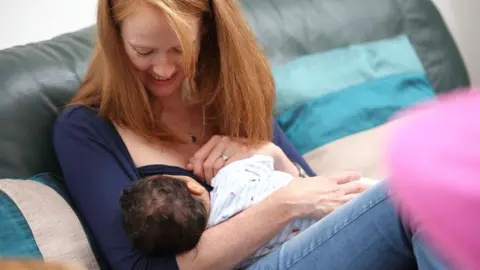 Public Health Wales
Public Health WalesHalf of parents-to-be in Wales are either unsure or have decided against breastfeeding, according to a survey.
Public Health Wales (PHW) research also showed one in five of those who breastfeed do so for less than a month.
It recommends exclusively breastfeeding for the first six months but added breastfeeding does not come easily to all mothers.
Campaigners said some were "shamed" into persevering with breastfeeding even when the babies are going hungry.
The Fed Is Best campaign said clinically safe feeding "comes in a variety of forms".
It said babies not receiving enough milk were at risk of jaundice, hypoglycemia and dehydration.
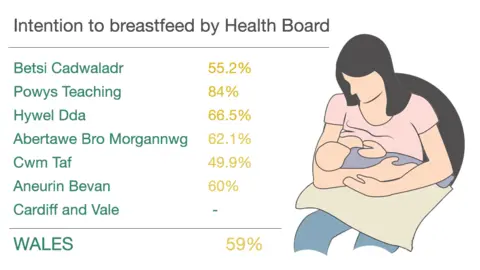
"All mothers who wish to breastfeed should be supported in doing so while ensuring their child receives all the nutrition they need to remain healthy and safe.
"We have found that mothers often feel immense pressure by society and by current breastfeeding protocols to only breastfeed their newborns, even when they do not have enough milk to do so."
Women can also experience pain, bleeding or cracked nipples, especially if the baby has not attached properly.
PHW's survey showed 51% of people asked were definitely planning to breastfeed when they became parents in future - meaning 49% were going to bottle feed or were unsure.
As part of its campaign, mothers offered advice to breastfeeding parents and those considering feeding options.
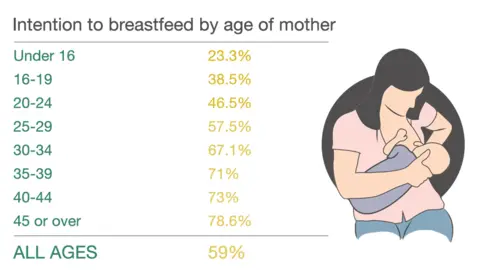
PHW said breastfed babies were more likely to grow up a healthy weight and were at less risk of high blood pressure and heart disease as they got older. It can also provide health benefits for mothers.
Meanwhile, a Welsh Government report showed of more than 30,000 births in 2015-16, 59% of new mothers intended to breastfeed - ranging from 50% in the Cwm Taf health board area to 84% in Powys. Cardiff and Vale figures were not available.
Alice Wilkins from Cardiff, breastfed her baby Eli, now two, for 14 months.
"At first, getting the latch right was frustrating," she said.
"I found the best thing that I could do was stop trying, hold Eli and calm him and take a few deep breaths to calm myself.
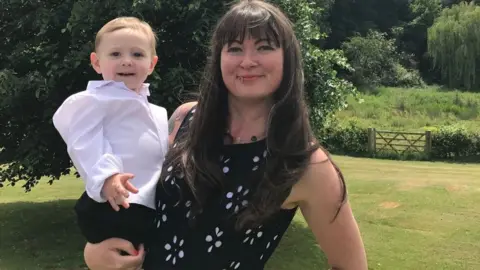 Public Health Wales
Public Health Wales"Before my milk came in I would worry about him being hungry, so a few times I would hand express on to a teaspoon and pour it into his mouth.
"It would soothe him and give him a bit of food, and give me some time to relax a little before trying again.
"My top tip would be build a nest. Take the best seat on the sofa, surround yourself with everything you could need, TV controls, a cup of tea, a book.
"I even had a foot rest and a nice V pillow to nestle Eli on to. You'll be there a while so you might as well be comfortable."
Nia Bettridge, mother of 22-week-old Elise, said: "Don't feel guilty if breastfeeding doesn't work out for you, it is not for everyone.
"Doing what suits you and baby is the most important."
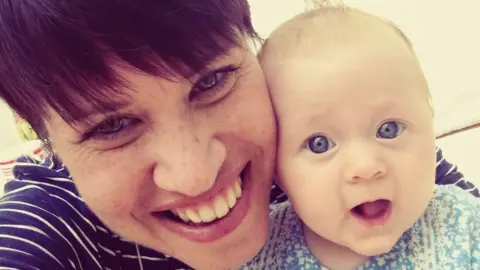 Public Health Wales
Public Health WalesKaren Thompson from PHW said: "In many parts of Wales breastfeeding is very rare and bottle feeding is normal.
"Unless we can change this, many babies in Wales will not get the many benefits that breast milk brings in both short term and longer term health outcomes.
"Breast milk is all a baby needs in the first six months, providing them with all the vital nutrients to grow healthily.
"We need to understand more about why some parents are unsure about breastfeeding and help to address those concerns in a positive way."
Other tips included not worrying about routines and timings, researching breastfeeding, staying hydrated, asking for help, having confidence in your body - and not feeling guilty if breastfeeding does not work out.